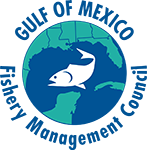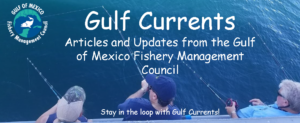
Next week, the Gulf of Mexico Fishery Ma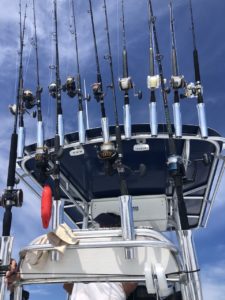 nagement Council will hold a hybrid in-person and virtual meeting from August 23-26, 2021. The meeting will be held at the Hilton Palacio del Rio Hotel in San Antonio, Texas. You can also join the meeting by webinar.
nagement Council will hold a hybrid in-person and virtual meeting from August 23-26, 2021. The meeting will be held at the Hilton Palacio del Rio Hotel in San Antonio, Texas. You can also join the meeting by webinar.
The public will have two opportunities to interact with the Council during the meeting:
An informal Question and Answer session will be held immediately following Reef Fish Committee on Tuesday, August 24, 2021. Leaders from the Gulf Council, NOAA Fisheries, and Southeast Fisheries Science Center will answer questions from the public about the science and management of fisheries in the Gulf of Mexico. In-person attendees will be welcome to this session. Virtual attendees must join the webinar online to speak and ask questions. Alternatively, during the meeting, you can email questions to [email protected] or text them to (813) 317-6220 and a staff member will ask on your behalf. To listen in by phone, call: 1-(562) 247-8422 and use the Audio Access Code: 769-105-242.
Public testimony will be held from 2:45 – 5:30 PM central time on Wednesday, August 25, 2021. In-person attendees wishing to give public testimony must sign-up using the kiosk outside the meeting room. Virtual attendees must register online and join the webinar. A registration link to provide testimony will be available on the Council meeting materials webpage beginning at 8:30 AM, CDT on Wednesday, August 25th. Registration to provide virtual testimony will close one hour before public testimony begins (1:45 PM CDT). Virtual participants must register for the webinar under the same name they use to register to provide testimony. Instructions on how to use the webinar and troubleshoot if you experience difficulty can be found here.
Two new Council members and three reappointed Council members will be inducted at the beginning of the meeting. During the meeting, the Council will convene in closed session to appoint members to its Special Coral, Mackerel, and Shrimp Scientific and Statistical Committees. The Council also plans to present the 2020 Law Enforcement Officer/Team of the year award to Texas Parks and Wildlife Marine Tactical Operations Group. The following is a brief description of some of the other issues that will be addressed during the meeting:
Shrimp Vessel Position Data Collection
The cellular electronic logbook units that are currently on vessels stopped transmitting shrimp effort data at the end of 2020. The Council will review a draft Framework Action that considers setting up reporting requirements for federally permitted shrimp vessels and transitioning to a new platform to replace the expiring cellular electronic logbook program.
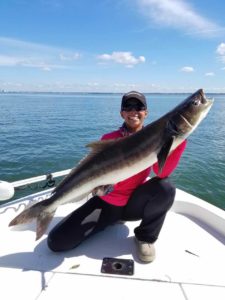
Photo: Rosmary White
Cobia
The Council will review a draft of Costal Migratory Pelagics Amendment 32, which considers modifying cobia catch limits; apportionment between the Gulf and Florida East Coast (FLEC) Zones; sectorallocations in the FLEC zone; and, management measures including possession limits, vessel/trip limits, and minimum size limits. The recent SEDAR 28 Update stock assessment showed that the cobia stock is not overfished but is currently experiencing overfishing. The assessment used the new Marine Recreational Information Program’s Fishing Effort Survey (MRIP-FES) estimates which increased the estimates of recreational catch and effort. Based on the assessment, the Council’s Scientific and Statistical Committee recommended new overfishing limits and acceptable biological catch levels for 2021-2023 and beyond. While the assessment projections appear to allow for increased harvest, under MRIP-FES they actually represent an approximate 30% reduction from the current allowable harvest. The Council is required to end overfishing and consider updating cobia annual catch limits (ACLs).
King Mackerel
The Council will review a draft of Coastal Migratory Pelagics Amendment 33, which considers modifying king mackerel catch limits and the sector allocation. The recent SEDAR 38 Update stock assessment determined that king mackerel is not overfished and is not experiencing overfishing, but has been depleted further since the last stock assessment. The update assessment used the new MRIP-FES recreational landings and effort estimates, which nearly doubled historic estimates of recreational harvest. Based on the results of the update assessment, the Council’s Scientific and Statistical Committee recommended increasing the king mackerel overfishing limit (OFL) and acceptable biological catch (ABC) levels through 2024.
Red Grouper
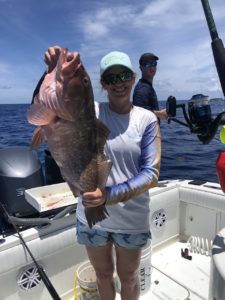
Photo: Carrie Simmons
The Council’s SSC recently reviewed an adjustment to the recreational landings in weights provided by the SEDAR 61 assessment model. Additionally, the SSC
considered an interim analysis that modifies red grouper abundance estimates based on NMFS Bottom Longline Survey data. As a result, the SSC increased its recommendation for the red grouper OFL and ABC. The Council will take its first look at a Framework Action that considers increasing red grouper catch levels to align them with the newly recommended OFL and ABC.
Red Snapper
The Council plans to hear updates from the Gulf States on their 2021 Red Snapper State Management Programs. Additionally, the Council will discuss the Framework Action it took final action on in April 2021, that addresses Red Snapper Recreational Data Calibration and Recreational Catch Limits. The Council decided to apply state-specific calibration ratios developed by the Gulf States and NOAA’s Officeof Science and Technology so that state survey data can be converted to MRIP-CHTS ‘data currency’. This will ensure that the data used to monitor harvest can be compared to the data used to set the ACLs, and used in stock assessments. The Council recommended th
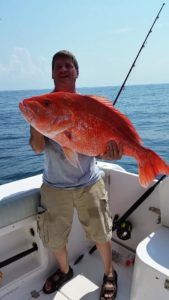
Photo: David Payne
at NOAA Fisheries delay implementation of this framework action until January 1, 2023, in anticipation of new catch advice that would be developed before calibrations were applied. NOAA Fisheries has indicated that waiting to implement the calibrations would violate the federal law because it would allow the red snapper ACL to be exceeded in 2022. The Council is expected to discuss a legally viable path forward.
Commercial Individual Fishing Quota Program
The Council will continue to work on two documents that consider modifications to the commercial individual fishing quota (IFQ) programs. Reef Fish Amendment 36B considers requiring IFQ shareholder accounts to be associated with a commercial reef fish permit. Reef Fish Amendment 36C considers a mechanism for distributing unused shares reclaimed by NOAA Fisheries, quota banks, and modifying the accuracy of estimated weights in advance landings notifications.
